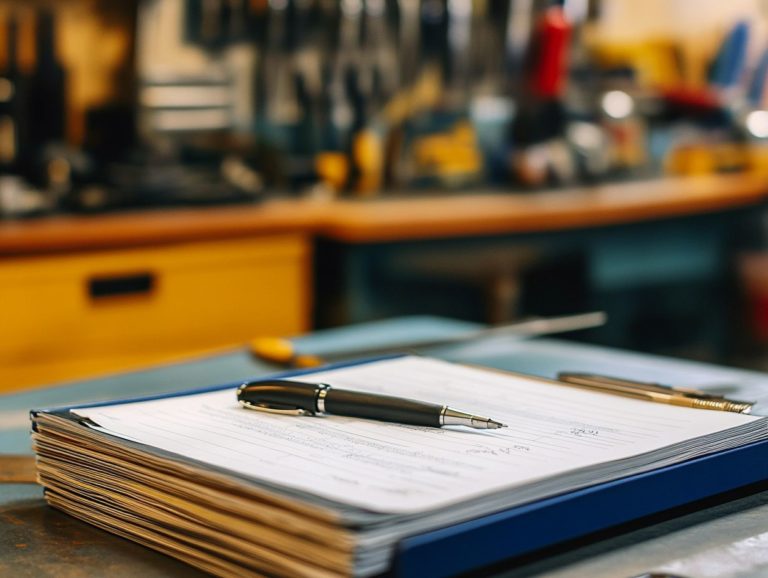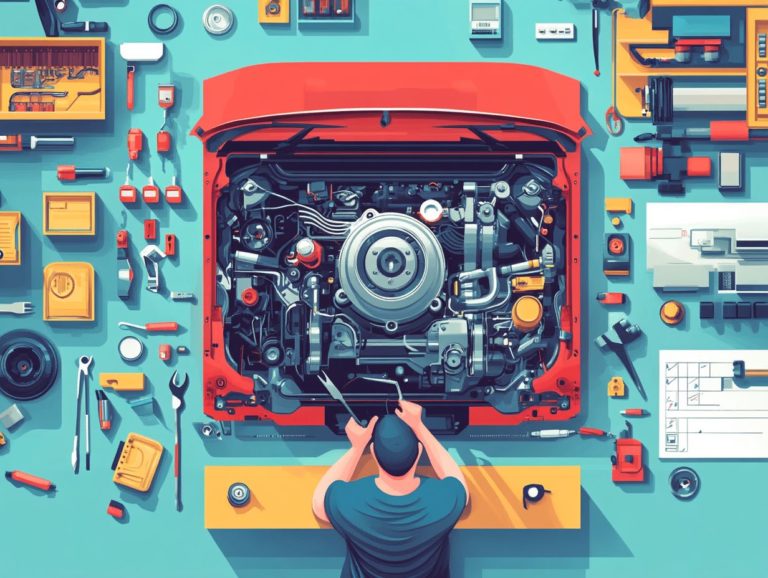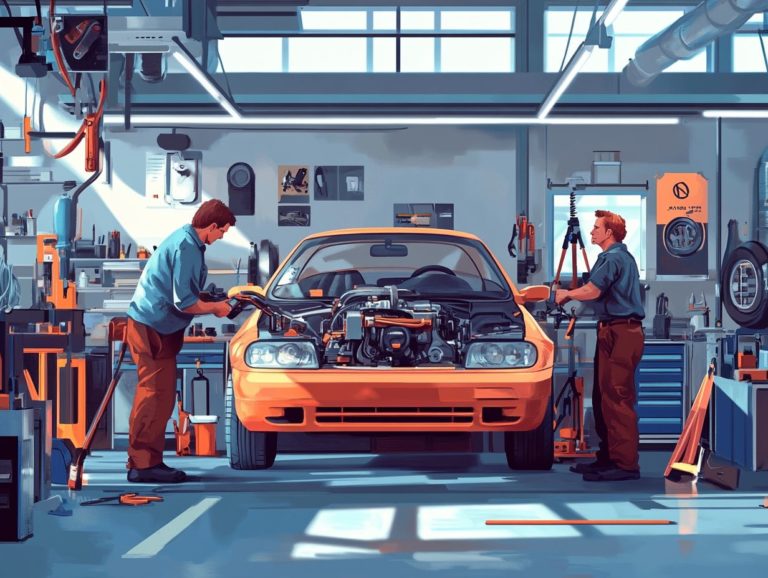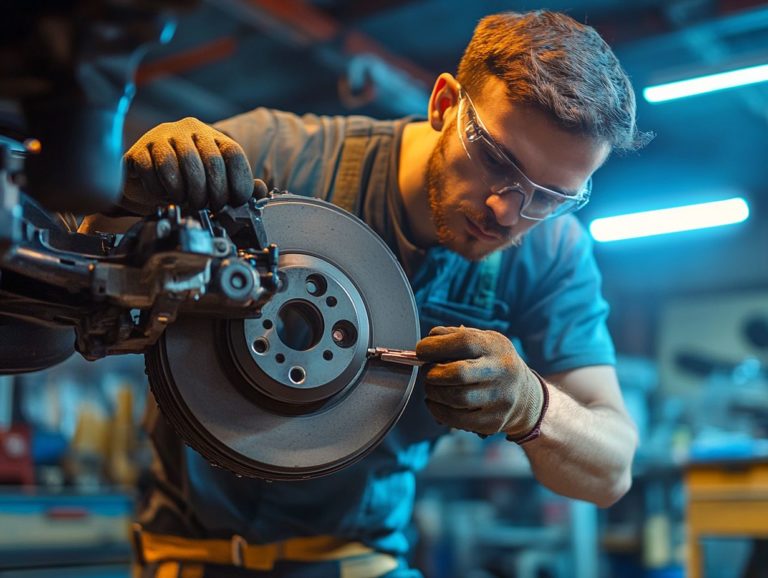Essential Car Maintenance Tasks for Every Vehicle
Regular vehicle maintenance is vital for your safety and vehicle performance. From oil changes to tire care, each aspect plays a crucial role in keeping your car running smoothly.
This guide covers the essential maintenance tasks that every car owner should prioritize. You ll learn how often to change your oil, why monitoring tire pressure and tread depth matters, the signs of battery health, the timeline for brake inspections, and the importance of keeping an eye on fluid levels.
It also shows other key tasks, such as replacing air filters, spark plugs, and wiper blades. By staying on top of these maintenance duties, you ll enhance your vehicle s performance and save yourself from costly repairs in the future.
Let s dive in and keep your vehicle in top shape!
Contents
- Key Takeaways:
- Oil Changes
- Tire Care
- Battery Maintenance
- Brake Inspections
- Stay on Top of Your Fluid Levels for a Smooth Ride
- Other Essential Maintenance Tasks
- Frequently Asked Questions
- What are some essential car maintenance tasks that every vehicle owner should know?
- How often should I get my car’s oil changed?
- What are the consequences of not regularly changing my car’s oil?
- How can I check my car’s tire pressure and tread?
- Why is it important to change air filters in my car?
- When should I replace my car’s wiper blades?
Key Takeaways:
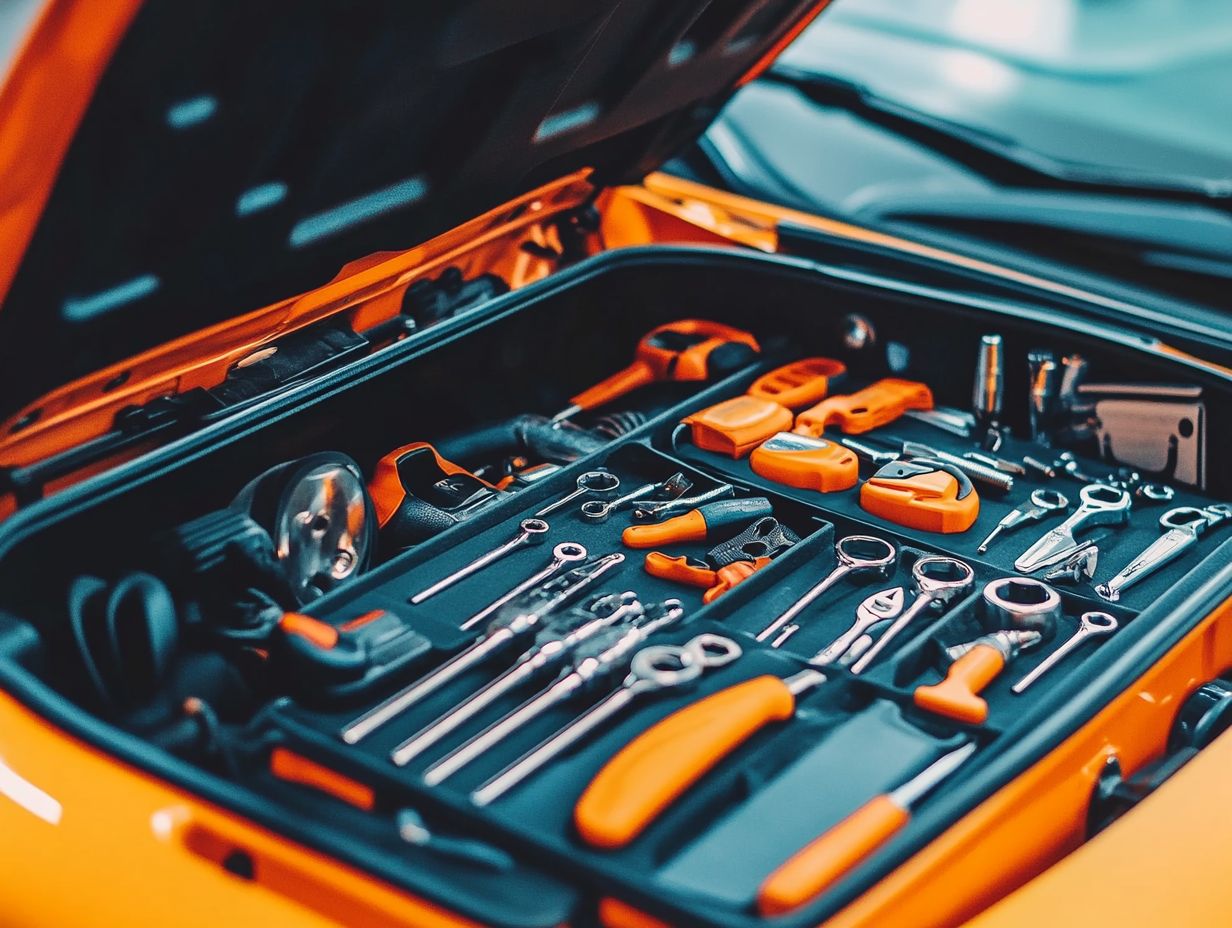
- Regular maintenance is crucial for ensuring a safe and efficient vehicle.
- Oil changes, tire care, battery maintenance, and brake inspections are essential tasks to keep your car running smoothly.
- Don’t forget to regularly check and change your fluid levels, air filter, spark plugs, and wiper blades for optimal performance and longevity of your vehicle.
Start implementing these tips today for a safer, more reliable ride!
Why Regular Maintenance is Important
Regular vehicle maintenance is essential for ensuring your car performs at its best, boosting its resale value, and extending its lifespan. Utilizing the ultimate checklist for seasonal car maintenance can help you stay on track.
Neglecting routine inspections can lead to unexpected issues that escalate repair costs and compromise your safety on the road. Seasonal check-ups are particularly vital, as they prepare your vehicle for extreme weather conditions whether it s getting the cooling system ready for summer or ensuring the battery is in peak condition before winter hits.
An emergency kit stocked with essentials like first-aid supplies, a flashlight, and basic tools provides peace of mind and can be a lifesaver during unforeseen situations. By prioritizing these maintenance practices, you re making informed decisions that safeguard your investment and enhance your overall driving efficiency and reliability.
Oil Changes
Regular oil changes are crucial for maintaining the health of your engine. By ensuring that oil levels which refers to how much oil is in the engine remain optimal and the oil filter is functioning effectively, you enhance your vehicle’s performance while extending your engine’s lifespan.
This routine task prevents potential engine problems that can arise from dirty oil. By adhering to the guidelines in your maintenance schedule, you can easily keep track of when it s time to change your engine oil and filter, ensuring your vehicle continues to run smoothly.
Frequency and Importance
How often you change your oil depends on your engine and driving habits. Regular oil changes keep your engine running smoothly and help prevent serious problems.
When you re navigating city streets, you often encounter stop-and-go traffic, frequent idling, and shorter trips, all of which can cause the oil to break down more quickly. On the flip side, highway driving allows the oil to circulate more evenly and reach optimal temperatures, helping it maintain its integrity for a longer time.
Consequently, if you primarily drive in urban environments, you may need to change your oil more frequently to counteract these tougher conditions. Meanwhile, those who predominantly cruise on highways can typically enjoy a longer interval between changes. Understanding these driving dynamics can enhance both the performance and longevity of your engine.
Tire Care
Proper tire care is vital for your safety and vehicle performance. By regularly checking tire pressure and tread depth, you not only prevent uneven tire wear but also extend the lifespan of your tires.
Moreover, adhering to the recommended maintenance schedule for tire rotation fosters balanced wear, resulting in improved handling and a smoother ride.
Checking Pressure and Tread
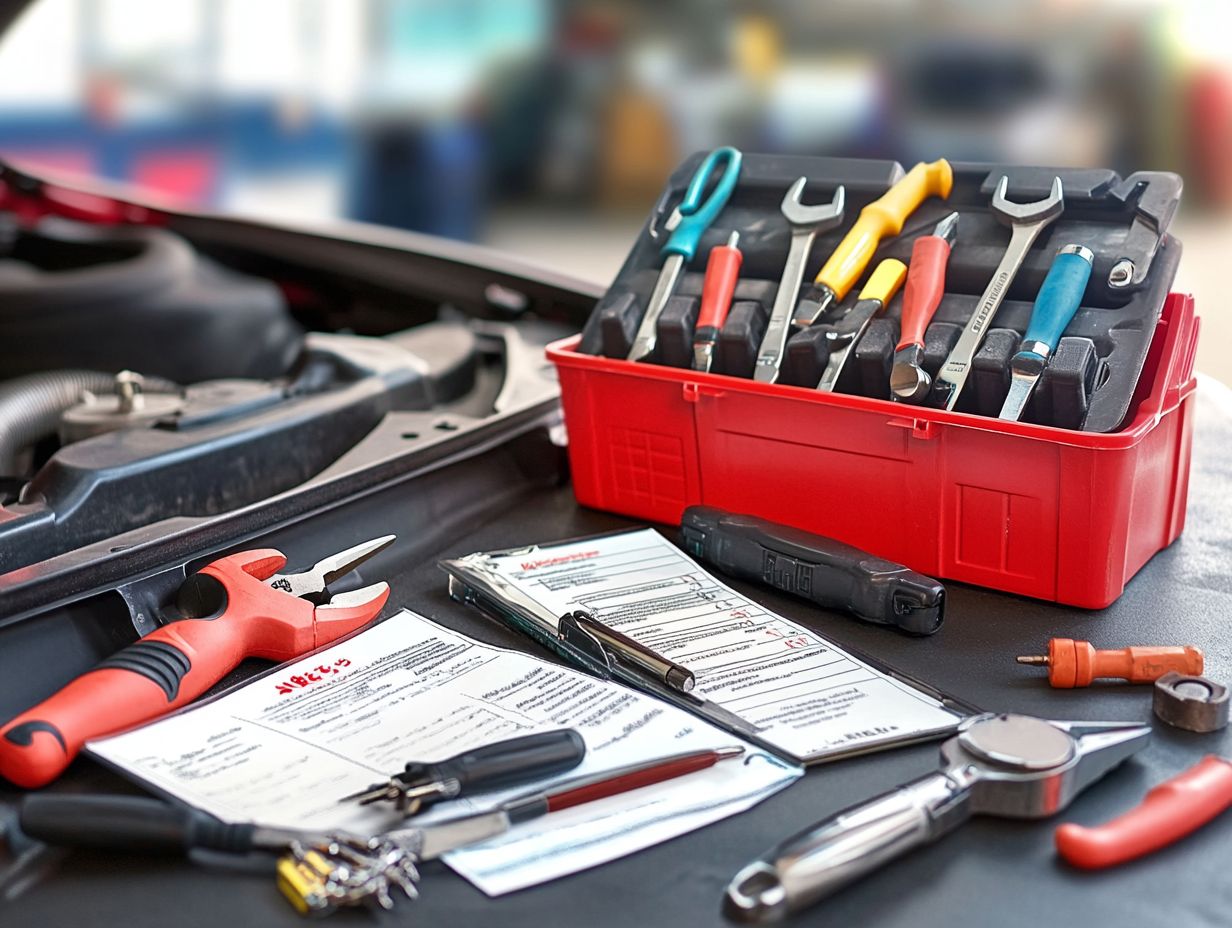
Regularly checking your tire pressure and tread depth is crucial for ensuring your vehicle’s safety and performance. Keeping your tire pressure at the right level can improve fuel efficiency.
Sufficient tread depth is key for effective traction and braking.
To keep everything running smoothly, you should use a reliable tire gauge to measure the pressure at least once a month and before embarking on long trips. Make any necessary adjustments according to the manufacturer s recommended psi.
Assessing tread depth is just as important. A simple penny test can help you determine whether your tires are wearing down. It’s vital to monitor these tire conditions, especially during seasonal transitions, since temperature changes can impact both pressure and traction.
Keeping your tires in check not only extends their life but also gives you peace of mind, enabling you to navigate various road conditions with confidence.
Battery Maintenance
Battery maintenance is essential for achieving peak performance and avoiding unforeseen breakdowns. By conducting regular inspections, you can spot early signs of a failing battery, including struggles to start your vehicle and dimming lights.
Using the right car tools will enable you to assess your battery’s health with precision, ensuring you’re always prepared for the road ahead.
Signs of a Failing Battery
Recognizing the signs of a failing battery is crucial for maintaining optimal performance and ensuring your vehicle operates smoothly. Keep an eye out for common indicators like warning lights on the dashboard, slow engine cranking, and dimming lights these all signal that it s time for a battery check.
To accurately assess battery health, automotive professionals often turn to multimeters (tools that measure electrical voltage) and specialized battery testers. These tools measure voltage levels and cranking amps, allowing for early diagnosis of potential issues.
Replacing your battery in a timely manner can prevent unexpected breakdowns, keeping your vehicle reliable whether you’re commuting daily or embarking on longer journeys.
Consistent battery maintenance like cleaning terminals and checking connections plays a pivotal role in extending battery life and enhancing overall vehicle performance. By staying proactive, you can sidestep the stress of unforeseen failures and ensure your automobile remains functional and efficient.
Brake Inspections
Brake inspections are essential for maintaining your driving safety, as they directly influence your vehicle’s ability to stop when it matters most. Regularly checking your brake pads, fluid levels, and brake lights can avert potential hazards on the road.
Prioritizing these inspections enhances safety and extends the life of your vehicle.
When to Get Your Brakes Checked
Knowing when to get your brakes checked is crucial for ensuring your driving safety and maintaining optimal vehicle performance. If you start hearing squeaking sounds, experience longer stopping distances, or notice warning lights signaling brake issues, it’s crucial to inspect your brake pads and system immediately.
Regular inspections are recommended at least every 12,000 miles or during routine oil changes to keep everything functioning properly. If you frequently navigate harsh conditions like heavy traffic or rough terrain consider checking your brakes even more often.
Maintaining working brake lights is crucial. They communicate your intentions to others on the road, helping to ensure everyone s safety. Neglecting your brakes can lead to increased wear and tear, not to mention dangerous situations. This shows why timely maintenance is vital.
Stay on Top of Your Fluid Levels for a Smooth Ride
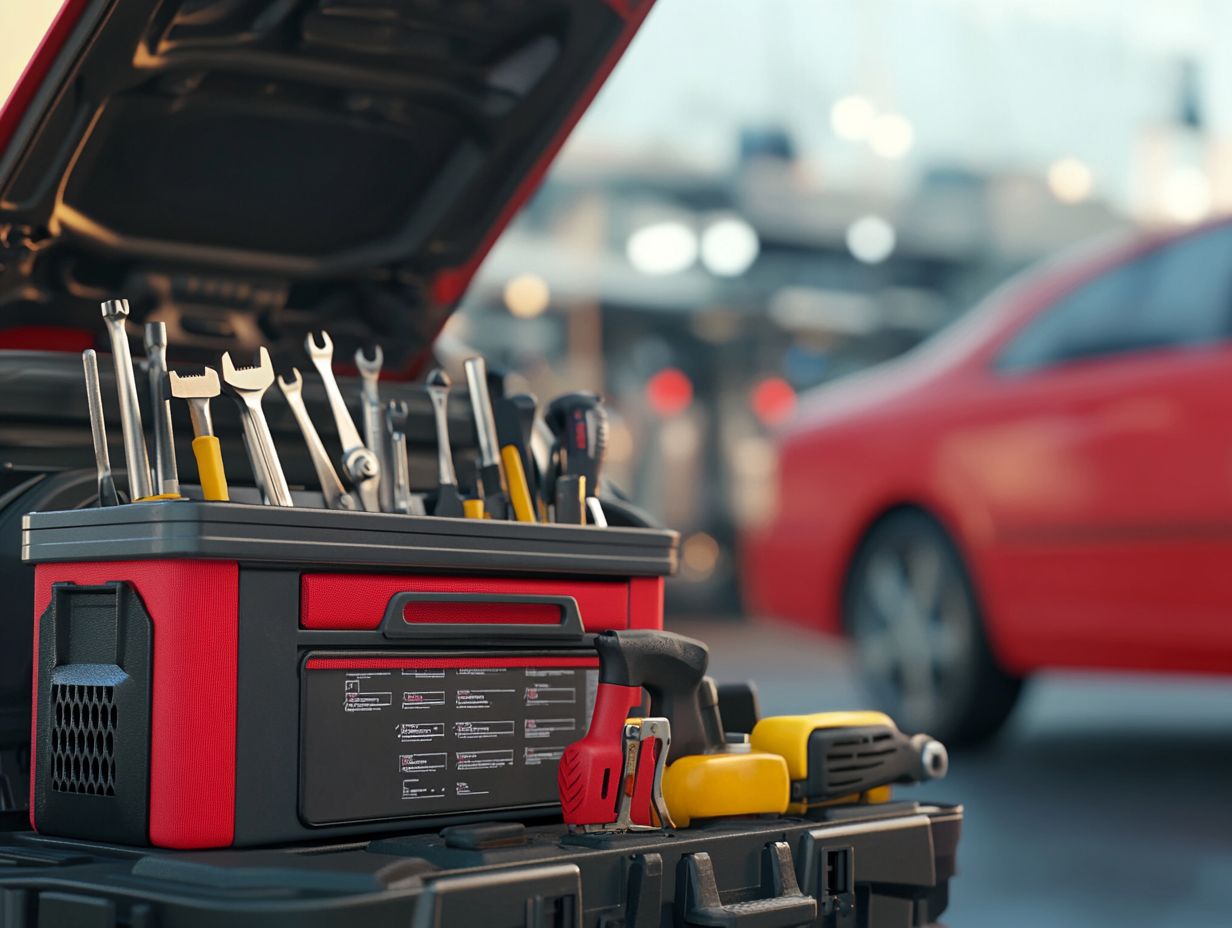
Check your fluid levels regularly to keep your engine roaring! Monitoring fluid levels and making timely adjustments are essential for achieving optimal vehicle performance and longevity. Key fluids like coolant, transmission fluid, and differential fluid are crucial to the operation of various vehicle systems.
Keeping these fluids in check ensures smooth operation and helps prevent potential engine issues down the line.
Importance of Regular Checks and Changes
Regularly checking and adjusting your fluid levels is essential for preventing engine problems. Keeping a close eye on coolant levels and performing timely coolant exchanges can help you avoid overheating and other critical issues.
Monitor engine oil quality and transmission fluid as they are vital for proper lubrication and smooth gear transitions. Neglecting to check your engine oil can lead to decreased performance and severe damage due to friction. Outdated transmission fluid can cause shifting problems.
Don’t overlook brake fluid and power steering fluid. Regular inspections are necessary, as inadequate levels can significantly affect your vehicle s handling and safety. Failing to maintain these essential fluids can lead to costly repairs, reduced efficiency, and compromised safety on the road.
Other Essential Maintenance Tasks
Beyond routine oil changes and fluid checks, several essential maintenance tasks enhance both the efficiency and safety of your vehicle:
- Regularly replacing the air filter
- Changing spark plugs
- Updating windshield wipers
These tasks boost your vehicle’s performance and ensure clean airflow and optimal visibility in adverse weather conditions. Prioritizing them is key to keeping your ride in top shape, and you can start with the top 10 car maintenance tips for beginners to prepare for any journey ahead.
Air Filter Replacements
Replacing the air filter regularly is crucial for maintaining optimal vehicle performance. A clogged air filter can reduce fuel efficiency and increase engine wear, making it vital to stick to your maintenance schedule.
When the air filter becomes dirty or clogged, the engine must work harder to draw in the air it requires. This effort can diminish fuel efficiency and elevate emissions. Signs such as a decrease in acceleration, unusual engine noises, or a rise in exhaust emissions indicate that a replacement is needed.
Typically, manufacturers suggest checking the air filter every 12,000 to 15,000 miles. However, if you frequently navigate heavy traffic or dusty environments, more frequent inspections may be necessary. Prioritizing air filter maintenance can help prevent costly repairs while enjoying improved performance and fuel economy.
Spark Plug Replacements
Regularly replacing your spark plugs is essential for ensuring optimal engine performance, as they play a crucial role in the way your engine burns fuel. Worn or faulty spark plugs can lead to engine misfiring, reduced fuel efficiency, and increased emissions.
Signs of worn spark plugs include difficulty starting your engine, a rough idle, or a noticeable decrease in acceleration. An unexpected increase in fuel consumption often points to ineffective combustion caused by aging plugs.
By regularly inspecting these components, you can prevent performance issues and enhance the longevity of your engine. To maintain peak performance, check the condition of your spark plugs during routine maintenance visits.
Replacing them every 30,000 to 100,000 miles, depending on the manufacturer s recommendations, leads to a smoother operation and optimal fuel efficiency, benefiting both your vehicle and the environment.
Make these checks part of your routine to drive with confidence!
Wiper Blade Replacements
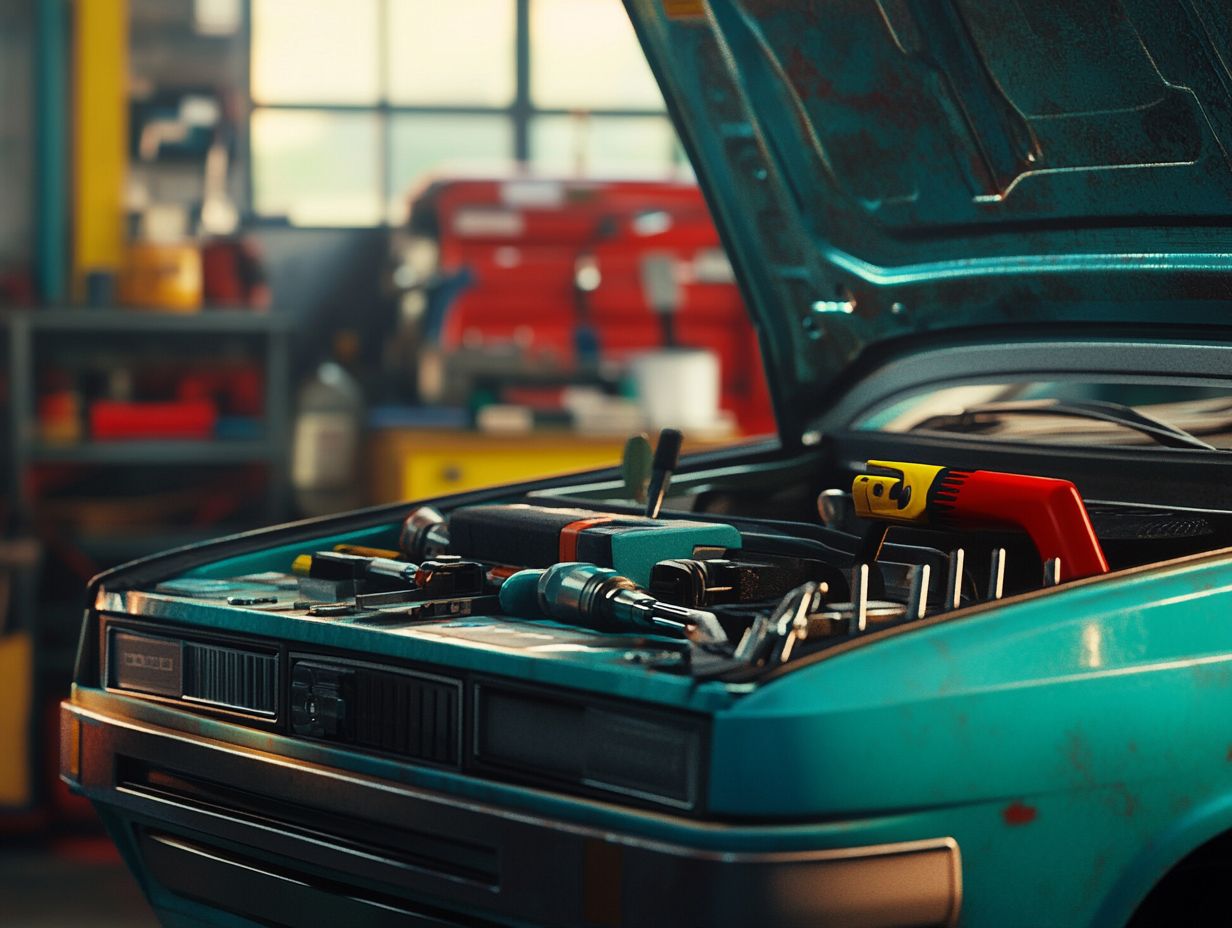
Regularly replacing your windshield wipers is crucial for maintaining your driving safety, especially in bad weather. Worn-out wiper blades can make it hard to see, affecting your ability to drive safely. So, make it a habit to check your wiper blades regularly!
To check if your wiper blades need replacing, look for signs of wear like cracks, splitting rubber, or a streaky sweep when they re in use. Ignoring these signs not only reduces visibility but can also strain your wiper motor the part that powers the wipers leading to costly repairs later on. Don’t wait until a storm hits. Check your wipers now!
Change your wiper blades every six months. However, local weather conditions and how often you use them may require more frequent checks. By staying vigilant about these components, you can significantly enhance both your driving safety and overall comfort.
Frequently Asked Questions
What are some essential car maintenance tasks that every vehicle owner should know?
Essential car maintenance tasks include regular oil changes, checking tire pressure and tread, changing air filters, and replacing worn-out wiper blades.
How often should I get my car’s oil changed?
You should change your car’s oil every 3,000 to 5,000 miles or every 3 months. Your engine will thank you!
What are the consequences of not regularly changing my car’s oil?
Not changing your car’s oil regularly can lead to decreased fuel efficiency, engine damage, and potentially expensive repairs.
How can I check my car’s tire pressure and tread?
You can check your car’s tire pressure with a tire pressure gauge. Visually inspect the tread for uneven wear, or use the “penny test” insert a penny into the tread; if you can see Lincoln’s head, it’s time for new tires.
Why is it important to change air filters in my car?
Air filters keep dirt, debris, and pollutants from entering your car’s engine, which can improve fuel efficiency and prevent engine damage.
When should I replace my car’s wiper blades?
Replace wiper blades every 6 months to a year, or when they start leaving streaks on your windshield or making noise.

